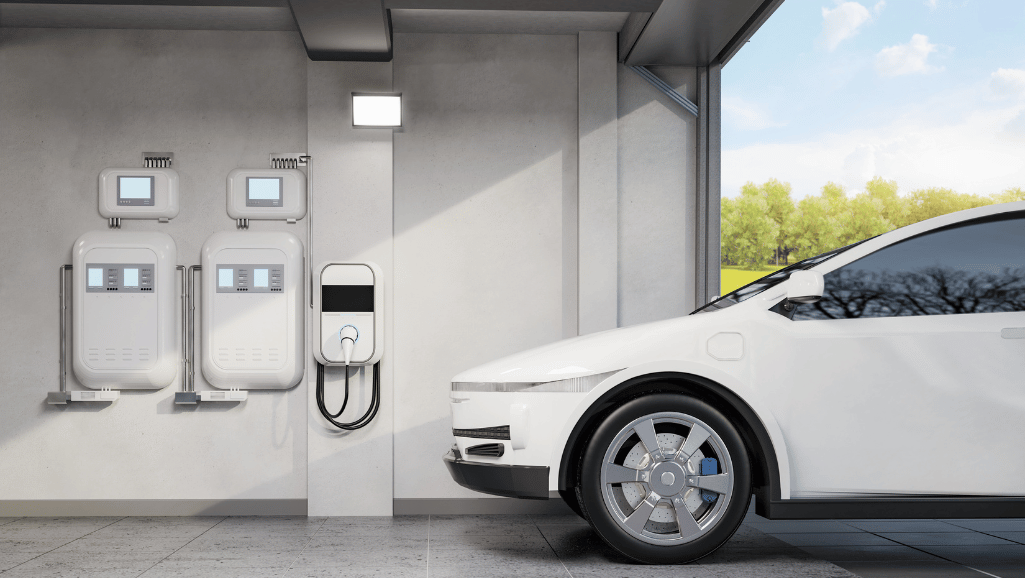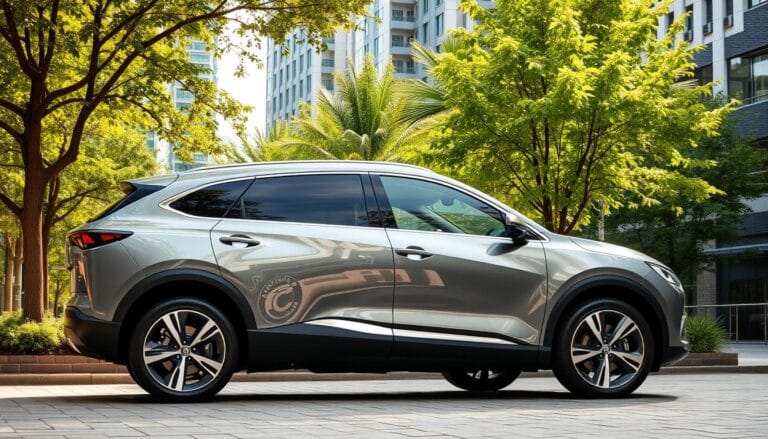The electric vehicle (EV) market is growing fast. New ev firms and ventures are leading the way. With 183 electric vehicle startups, the industry is changing quickly. These companies are making cars better, pushing tech forward, and getting lots of money.
In 2023, EV startups got $4.8 billion in funding. Series C rounds got the most, with $2.1 billion. Seed and Series A rounds also got a lot of money. In 2024, EV startups have already raised $613 million, showing investors believe in electric cars. EV startup List
These startups are working on many things. They’re improving batteries and charging systems. Companies like WeaveGrid and Freewire Technologies are getting a lot of attention. Vinfast and BluSmart are also growing fast.
The electric car market could be huge, worth $1.5 trillion by 2030. With a growth rate of 17.8%, EV startups are key to a greener future.
Key Takeaways
- The number of EV startups in databases has reached 183, with a total funding of $4.8 billion raised in 2023.
- Series C funding rounds accounted for the highest investment at $2.1 billion, followed by Series B at $767 million.
- In 2024, EV startups have already secured $613 million in funding, showcasing investor confidence in the industry.
- Notable startups like WeaveGrid, Freewire Technologies, and Vinfast have experienced significant search growth over the past five years.
- The electric vehicle industry is projected to reach a market size of $1.5 trillion by 2030, with a CAGR of 17.8%.
Overview of the Electric Vehicle Market Trends
The electric vehicle (EV) market is changing fast. Disruptive mobility companies and sustainable transport ventures are leading the way. In 2023, the global electric vehicle market size was USD 500.48 billion. It’s expected to grow to USD 1,891.08 billion by 2032, with a CAGR of 13.8%.
Growth Projections for EV Adoption
The Asia Pacific region, mainly China, is expected to lead the electric vehicle market. It will hold a 51.24% market share in 2023. The U.S. electric vehicle market is projected to reach USD 233.70 billion by 2032. Governments are offering incentives to encourage EV sales.
Technological Advancements Driving Innovation
Green automotive upstarts are innovating fast. They’re improving battery technology and engine designs for longer ranges. Toyota plans to introduce solid-state battery technology by 2027-2028. This battery will travel 1,000 km and charge in just 10 minutes.
Key Players Shaping the Industry Landscape
Pioneering zero-emission brands like Tesla and BYD are leading the EV market. In 2023, they together made up 35% of all electric car sales. BYD had over 20% of the global electric car market share in 2023. Tesla’s market value is seven times higher than BYD’s.
| Company | Market Share (2023) |
|---|---|
| BYD | 20% |
| Tesla | 15% |
| Other Carmakers | 65% |
As the electric vehicle market evolves, disruptive mobility companies and sustainable transport ventures will be key. They will shape the future of transportation.
Notable Electric Vehicle Startups to Watch
The electric vehicle (EV) industry is booming with new startups. Each one aims to make a big impact in the fast-changing market. A few stand out for their innovative tech, big funding, and leading the way in green transport.
These EV innovators have raised a total of $2.1 billion. On average, each company got $31.7 million. Wallbox got the most, with $61.94 million. But Motorway leads with a whopping $271.64 million in funding.
Company Profiles: Overview and Mission
Each company has its own unique goal. Here are a few examples:
- Metastable Materials can recover 90% of materials from old lithium-ion batteries.
- Log9 Materials has made over 6,500 batteries and has 150 fleet partners. They’ve also cut down over 2,600 tons of CO2.
- Attero Recycling runs a 100,000 square feet plant for e-waste recycling. They aim for zero landfill waste.
- Ather Energy is India’s third-largest electric two-wheeler maker.
- Exponent Energy can charge a vehicle in just 15 minutes with their tech.
Funding and Investment Highlights
EV startups have seen a lot of investment. Some big funding rounds include:
| Company | Funding Amount | Funding Round |
|---|---|---|
| WeaveGrid | $50 million | Series B |
| Freewire Technologies | $259.4 million | – |
| Rad Power Bikes | $329.3 million | Series D |
| Zenobe Energy | $2.5 billion | Debt Financing |
| BluSmart | $487.3 million | Debt Financing |
Unique Selling Propositions
These EV companies stand out for different reasons:
- WeaveGrid is working on the electrical grid to support more EVs.
- Freewire Technologies has “ultrafast” chargers for quick charging. They work with big names like Netflix and Adobe.
- Rad Power Bikes sells bikes directly to customers with clear prices. They’re the biggest electric bike provider in the US.
- Volta Charging uses big LED screens for ads while you charge.
- ChargePoint has the biggest global EV charging network. They add over 2,000 chargers every month.
With the EV market expected to hit $1.5 trillion by 2030, these startups are key players in green transport’s future.
Leaders in Sustainable EV Technology
Electric vehicle startups are leading the way to a greener future. They are creating groundbreaking EV tech and working with big automakers. This helps make eco-friendly cars more common.
EV startups are focusing on cutting-edge battery innovations. Companies like Rimac in Croatia have gotten big investments. Rimac is known for its electric cars and battery tech.
Using renewable energy is key in the EV world. EV charging cost calculators show how electric cars save money. Startups like Ample in San Francisco are working on clean energy charging solutions.
Collaborations with Established Automakers
Strategic EV partnerships are important for electric cars to become more common. Fisker in Los Angeles has gotten $1.7 billion in funding. They work with big names like Magna International to improve EVs.
Startups like Canoo in California are leading by example. They focus on being eco-friendly. Canoo is funded to make electric cars that are good for the planet.
These startups are changing the EV market. Their focus on innovation and the environment is crucial. They are making a cleaner future possible with electric cars.
Global EV Startup Landscape: A Regional Analysis
The global ev ecosystem is seeing a rise in new startups. Each one is helping the electric vehicle industry grow fast. It’s important to look at what startups in different areas are doing.
North America: The Hub of Innovation
North America is a key place for electric vehicle innovation. Startups like Rivian, Lucid Motors, and Fisker are leading the way. They focus on making electric cars that are fast, luxurious, and good for the planet.
Rivian has made a big splash with its electric pickup truck and SUV. It has gotten a lot of money from Amazon and Ford. Lucid Motors is aiming for the high-end market with its luxury and efficient cars.
Europe: Regulatory Incentives and Growth
Europe is leading in electric vehicles thanks to strict rules and good incentives. Startups like Northvolt, Arrival, and Lightyear are doing well here. They are making big steps forward.
Northvolt in Sweden is working on making batteries better for the environment. It wants to build a big factory for EV batteries. Arrival in the UK is changing the game with its electric vans and buses.
Asia-Pacific: Dominating the Manufacturing Space
The Asia-Pacific region is a big player in EVs, with China leading in making and using them. Startups like Nio, Xpeng, and BYD are growing fast. They are making more cars to meet the demand.
| Region | EV Sales Growth (2023) | Key Startups |
|---|---|---|
| North America | 45% | Rivian, Lucid Motors, Fisker |
| Europe | 60% | Northvolt, Arrival, Lightyear |
| Asia-Pacific | 80% | Nio, Xpeng, BYD |
Nio is known as the “Tesla of China” and is doing well in the high-end EV market. Xpeng and BYD are also making a mark with their new designs and prices.
The global electric vehicle market is poised for continued strong growth across all segments in the coming decades, with regional ev trends shaping the industry landscape.
As we move towards a greener future, the work of these EV startups is key. They will help make electric cars more common around the world.
Challenges Facing New EV Startups
The electric vehicle (EV) industry is growing fast, with new companies joining to meet the demand for green cars. But, these startups face many challenges. They struggle with supply chain issues, regulatory hurdles, and competition from big car companies.
American EV startups like Lucid and Rivian are dealing with demand problems. This is because of high loan rates and shaky economic times. Lucid wants to make a bit more cars, while Rivian aims to keep making the same number. Auto loan interest rates have gone up a lot since 2021, making electric cars harder to afford.
Supply Chain Constraints and Material Sourcing
Getting the right raw materials is a big problem for EV startups. Shortages of things like semiconductors and lithium-ion batteries cause delays and higher costs. Rivian, for example, cut 10% of its salaried jobs to save money and deal with these issues.
Regulatory Hurdles and Compliance Issues
EV startups also face tough rules and regulations. These rules change by region, making it hard for startups to grow globally. Lucid plans to license its tech to other car makers to sell more cars and save money while following the rules.
Competition from Established Automotive Brands
The EV market is also crowded with big car companies. Ford and General Motors can handle downturns because they make gas cars too. They’re making more hybrid cars to compete with EV startups. Startups like Rivian and Lucid find it tough to get a piece of the market as big companies offer cheaper EVs.
Even with these challenges, some EV startups are hopeful. VinFast Auto wants to keep delivering cars despite the tough times. But, investors are careful about the money-making chances of startups like Lucid and Rivian. With 42% of startups failing due to lack of demand and over 60% of potential buyers worried about charging, EV startups have a tough road ahead.
Key Features Driving Startups’ Success
In the fast-changing world of electric vehicles, startups are making big moves. They focus on user-centric ev design and sustainable ev practices. This sets them apart from old automakers and leads to a greener future in travel.
Emphasis on User Experience and Design
One key ev success factor is focusing on user experience and design. Companies like Rivian have raised $10.7 billion. They work hard to make their cars easy to use, charge, and look good. This makes customers loyal and puts them at the top of the EV market.
Startups also use new tech to improve the user experience. XPeng Motors, a big name in China, uses smart tech in their cars. They have 41% of their patents in this area. This includes features like self-driving, real-time updates, and dynamic testing. XPeng Motors is making cars that meet today’s needs.
Commitment to Sustainability and Eco-friendliness
Startups also focus a lot on being green and eco-friendly. Companies like Rivian aim to be carbon neutral. They want to cut Scope 2 emissions by 2028 and Scope 3 by 2032. This appeals to people who want to reduce their carbon footprint.
| Startup | Sustainability Goal | Target Year |
|---|---|---|
| Rivian | Scope 2 Emissions Neutrality | 2028 |
| Rivian | Scope 3 Emissions Neutrality | 2032 |
EV startups also work on making charging easier. Rivian plans to build over 3,500 fast chargers by 2023. This makes electric cars more accessible and helps the transition to a greener future.
“We believe that the transition to a zero-emission future is not just a goal, but an imperative. By prioritizing sustainability and investing in eco-friendly initiatives, we are not only building better vehicles but also contributing to a healthier planet for generations to come.”
The Future of Electric Vehicle Startups
The electric vehicle (EV) market is set for huge growth. The ev market forecast predicts a market size of $1.5 trillion by 2030. EV startups are leading the way in innovation, changing how we travel.
Predictions for Market Evolution by 2030
By 2030, the EV market will see big changes. Battery prices are expected to drop, making EVs cheaper for more people. The U.S. will have 1.2 million public chargers, supporting EV growth.
Emerging Trends and Opportunities
EV startups are exploring new trends and opportunities. Companies like Lucid Motors and Lightyear are improving battery tech. Their cars can go up to 520 miles and 800 km.
Fisker’s Ocean model has a SolarSky roof and a special charger. It shows how EVs can use renewable energy and power homes.
| Startup | Search Growth (5 Years) | Funding |
|---|---|---|
| WeaveGrid | 2,400% | $50 million (Series B) |
| Rad Power Bikes | 144% | $329.3 million (Series D) |
| Freewire Technologies | 300% | $259.4 million |
| Vinfast | 189% | $6.5 billion (US EV production) |
The Role of Government Policies and Incentives
Government ev support is key for EV growth. Tax credits, subsidies, and emissions rules help EV startups. As governments focus on green transport, EV growth will keep increasing.
The future for EV startups looks bright. With advancing tech and growing demand, they’re set to lead the EV revolution. They’re making transport cleaner and greener.
Conclusion: The Importance of Innovation in EV Startups
The electric vehicle (EV) industry is changing fast, with startups leading the way. They are key to making transportation more sustainable. As electric cars become more popular, the need for innovation is clear.
Startups around the world are pushing technology forward. They are changing the EV world. Europe is a big player in this, with startups getting funding to grow.
These ev startup insights show the industry’s bright future. Companies are working on better charging, easier sales, and more efficiency. China is also leading, with big plans for EV production and battery making.
Startups face challenges like supply chain issues and competition. But, they are focused on making EVs better for users and the planet. They are working with others and getting government help to grow.
Summary of Key Takeaways
The EV industry is growing fast, with startups leading the way. Europe and China are key players, with startups getting funding. Despite challenges, the outlook is good, thanks to government support and a push for sustainability.
Startups that focus on user experience and technology will do well. They are shaping the future of EVs.
Final Thoughts on the Future of Electric Vehicles
Electric vehicles are key to a cleaner future. Startups are driving innovation, making EVs more affordable and better for users. With better batteries and charging, EVs will become even more popular.
The future of mobility is electric. Startups will lead this change, making our world greener and more sustainable.
FAQ
What is the current state of the electric vehicle market?
What is the current state of the electric vehicle market?
FAQ
What is the current state of the electric vehicle market?
The electric vehicle market is booming. In 2023, EV startups raised .8 billion. By 2030, it’s expected to hit
FAQ
What is the current state of the electric vehicle market?
The electric vehicle market is booming. In 2023, EV startups raised $4.8 billion. By 2030, it’s expected to hit $1.5 trillion, growing 17.8% annually.
What are some notable EV startups to watch?
Keep an eye on TIER Mobility, Einride, Lightyear, Volta Trucks, and Wallbox. They’ve raised a lot of money. They offer unique products like electric bikes, self-driving trucks, and smart charging systems.
Who are the leaders in sustainable EV technology?
Rimac Automobili and Tritium are leading the charge. They’re making fast electric cars and energy solutions. They’re working on better batteries and teaming up with big names like Hyundai and Porsche.
What challenges do new EV startups face?
New EV startups face many challenges. They struggle with finding materials, dealing with rules, and competing with big brands. They need to find reliable materials, follow complex rules, and stand out in a crowded market.
What features drive the success of EV startups?
Success for EV startups comes from focusing on user experience and design. They aim for easy-to-use interfaces and attractive looks. Being green and using renewable energy also attracts eco-friendly customers.
What does the future hold for electric vehicle startups?
The future looks bright for EV startups. The market is expected to keep growing. New tech like self-driving cars and better batteries will emerge. Government support will help the EV industry grow.
.5 trillion, growing 17.8% annually.
What are some notable EV startups to watch?
Keep an eye on TIER Mobility, Einride, Lightyear, Volta Trucks, and Wallbox. They’ve raised a lot of money. They offer unique products like electric bikes, self-driving trucks, and smart charging systems.
Who are the leaders in sustainable EV technology?
Rimac Automobili and Tritium are leading the charge. They’re making fast electric cars and energy solutions. They’re working on better batteries and teaming up with big names like Hyundai and Porsche.
What challenges do new EV startups face?
New EV startups face many challenges. They struggle with finding materials, dealing with rules, and competing with big brands. They need to find reliable materials, follow complex rules, and stand out in a crowded market.
What features drive the success of EV startups?
Success for EV startups comes from focusing on user experience and design. They aim for easy-to-use interfaces and attractive looks. Being green and using renewable energy also attracts eco-friendly customers.
What does the future hold for electric vehicle startups?
The future looks bright for EV startups. The market is expected to keep growing. New tech like self-driving cars and better batteries will emerge. Government support will help the EV industry grow.











